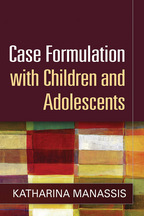Case Formulation with Children and Adolescents
Katharina Manassis
Hardcovere-bookprint + e-book
Hardcover
orderMay 19, 2014
ISBN 9781462515608
Price: $43.00 244 Pages
Size: 6" x 9"
Highly practical and accessible, this book shows how to synthesize complex information about child and adolescent mental health problems into clinically useful, dynamic case formulations. Strategies and tools are provided for analyzing the biological, psychological, social, cultural, spiritual, and developmental factors that may be contributing to the difficulties of clients ages 4-18. Numerous case examples illustrate the steps in crafting a comprehensive formulation and using it to plan effective, individualized treatment. Strategies for overcoming frequently encountered pitfalls in case formulation are highlighted throughout.
“Finally! This book will revive the vanishing skill of gathering multi-source clinical information and integrating it into a comprehensive formulation to guide culturally and developmentally sensitive biopsychosocial treatment. Manassis brings extensive clinical experience to her dedication to evidence-based mental health practice. This book should be required reading for all clinicians who aspire to provide optimal treatment for children and their families.”
—Mina K. Dulcan, MD, Professor of Psychiatry and Pediatrics, Northwestern University Feinberg School of Medicine; Department of Child and Adolescent Psychiatry, Ann and Robert H. Lurie Children’s Hospital of Chicago
“Child clinicians often struggle to form cogent case conceptualizations. Now their struggle is over! This expertly crafted, comprehensive guide is replete with charts, diagrams, and case examples to help both experienced and beginning clinicians paint rich conceptual portraits. Most important, Manassis's work is developmentally sensitive, culturally attuned, links treatment to formulation, and teaches clinicians to collaboratively share their conceptualization with young patients and their families. I will keep this book close to my desk for ready reference.”
—Robert D. Friedberg, PhD, ABPP, Professor and Director, Center for the Study and Treatment of Anxious Youth, Palo Alto University
“Manassis has an exceptional talent for illuminating key concepts through insightful yet concise clinical examples. Her knowledge, skills, and compassion as a master clinician are evident. This book helps clinicians tackle complex, challenging situations that require digging deeper into the child and family's history and experiences to help them reach their treatment goals. I highly recommend this book for seasoned clinicians as well as multidisciplinary trainees in child mental health. An amazing teaching tool, the book is filled with clinical pearls that will keep students engaged in learning. I plan to use it in my teaching and supervision with child psychiatry fellows and my multidisciplinary team.”
—Sucheta Connolly, MD, Department of Psychiatry and Director, Pediatric Stress and Anxiety Disorders Clinic, University of Illinois at Chicago
“Manassis, an extremely effective and knowledgeable psychiatrist, gives front-line professionals very practical guidelines for developing comprehensive formulations—even for the most complex cases—and revising them as needed. Examples throughout the book demonstrate the utility of Manassis's approach for preschoolers, school-age children, and adolescents. While this outstanding book is definitely very useful for all mental health clinicians, it is especially invaluable as a teaching tool for trainees in all mental health disciplines. I particularly appreciated the discussion of how to effectively communicate case formulations to children and their families.”
—Simon Davidson, MD, Children's Hospital of Eastern Ontario and Department of Psychiatry, University of Ottawa, Canada
Table of Contents
Introduction1. Benefits of Case Formulation and a Conceptual Framework
2. Gathering Relevant Information: Key Assessment Strategies
3. Biological Aspects of the Formulation
4. Psychological Aspects of the Formulation
5. Social Aspects of the Formulation
6. Spiritual and Cultural Aspects of the Formulation
7. The Process of Case Formulation and Considerations for Preschoolers
8. Case Formulation for School-Age Children
9. Case Formulation for Adolescents
10. Communicating the Case Formulation and Its Treatment Implications
11. Using the Formulation to Inform the Treatment Plan
12. Formulation Challenges and the Need to Monitor Progress
